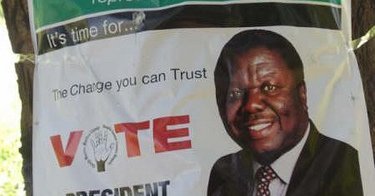Finally they were shaking hands: the two rivals Robert Mugabe and Morgan Tsvangirai could agree to a power-sharing agreement after weeks of negotiations. That happened although many analysts did not believe in the mediation process which was an „African“ one and lead by Thabo Mbeki, the South African President who had to step down from office on September 25.
84-year-old Robert Mugabe from the Zimbabwe African National Union – the Patriotic Front (ZANU-PF) - is in power since 28 years. While he has no generals’ uniform, many refer to him as a military dictator because of his dependence on the military establishment, and his brute domestic force. While for many, also in the West, Mugabe was an anti-colonial hero back in 1980, already during the 1990s his reputation was flawed. With the emergence of a real opposition party, the Movement for Democratic Change (MDC), and the loss of a constitutional referendum in 2000, Mugabe responded with repression and violence because he feared the expiration of his power.
Elections: A case of fraud
2002 and 2005 elections were reported by international observers as neither fair nor free, although South Africa and, in 2005, also the African Union accepted their results. After the raid against the opposition in March 2007, the Southern Africa Development Community (SADC) - under the lead of Mbeki - started talks between the government and the MDC, headed by Tsvangirai. The aim of the mediators is the adoption of a new constitution and free and fair conditions for elections.
The parliamentary elections held on 29 March 2008 interrupted for the first time in history the ZANU-PF majority, as the MDC won a 110 to 99 seats majority there. On the same day though, presidential elections were held which led to a lot of disputes. 56-year-old Tsvangirai, MDC candidate, claimed an outright victory over Mugabe, but the electoral commission withheld results for over a month. During this time Mugabe’s ZANU-PF launched a countrywide campaign of violence. Finally, on May 2, the electoral officials announced that Tsvangirai got more votes than Mugabe, but not the necessary 50% of the electorate. A second round was necessary.
The second round got quite scandalous, because Tsvangirai declared that he would not have been able to run on June 27 because of personal threats against him and his fellow members. While Mugabe, of course, won the presidential elections, the result was widely considered as illegitimate – especially because of the political violence used by Mugabe’s supporters.
The economic disaster and no help
While Zimbabwe was going through these political quarrels, the economic situation continued to deteriorate: corruption, food shortages and the collapse of vital services were spreading everywhere in the country. The official annual inflation rate is at the moment above 11,000,000% (!), only an estimated 20% of adults have a proper job, and Zimbabwe is to be known as the fastest shrinking economy in the world. A fifth of the adult Zimbabweans are thought of having HIV/AIDS, without much of action against the disease. Over the recent years, probably up to a third of the population has fled the country because of the political and economic turmoil. Western countries continue to boycott Mugabe’s regime and therefore cut off crucial aid for the civilians.
Western donors have been meeting as the „Fishmongers Group“, named after the restaurant in the capital Harare where the discussions first took place. The meetings have been taking place for the past 18 months to discuss how to react to the crisis in Zimbabwe and establish criteria for their participation. It is estimated that a package of aid worth around one billion euro a year could be fixed, what would be a three- or four-fold increase of aid in comparison with today. The donors, however, also have their own agenda. First, the security of tenure is vital. That would basically mean that former land owned by white farmers would have to be returned, as it was given away around eight years ago by Mugabe. Many Western analysts blame this act as mainly responsible for the economic crisis Zimbabwe is facing. On the other hand, some African analysts claim that the action was fair as a step to more independence from the former (British) colonial leaders.
Second, the reversal of recent laws decreeing that the government may prevent any foreign concern – and any white Zimbabwean – from owning more than half of any company will be important for the donors, as they argue that it will impede any chance for an economic boost.
Finally, it is vital for the donors that the existing restrictions of distribution of aid across Zimbabwe are lifted. In the past Mugabe declared that only through government aid should be distributed what provoked suspicions by Western donors and NGOs that the food and money will be channelled to Mugabe’s supporters.
The power-sharing agreement is undetermined
Any solution to Zimbabwe’s political and economic crisis would only be possible through a properly negotiated process to reach a genuinely workable government as the result and first steps for a new constitution to be written. At the same time, transition to democracy after the power-sharing agreement in Harare will remain fragile unless steps to address human rights abuses are taken. The MDC was still threatened in August, when police arrested six MDC parliamentarians, what was considered to be politically motivated. In general the repressive laws that violate basic human rights are still in place.
Any solution to Zimbabwe’s political and economic crisis would only be possible through a properly negotiated process
The details of the agreement have not yet been released, but reports suggest that Tsvangirai would become Prime Minister and head a new Council of Ministers, effectively running the country on a day-to-day basis. Mugabe, on the other hand, would continue to chair Cabinet meetings and would head the armed forces, while Tsvangirai would have responsibility for the police. The control of the security forces was one of the key questions during the negotiations, as the intelligence was a leading force in the attacks against MDC supporters ahead of the June election. President Mugabe has retained control of the security forces, as he chairs the National Security Council. Tsvangirai does however gain a seat on the NSC, which includes Zimbabwe’s military chiefs. It remains unclear who is ultimately in charge, some would even say that basically two executive powers, two parallel governments are existing now. Something not very promising indeed, because the two power centres will block each other.
What are the donors going to do?
Help from the West, especially the European Union and the United States, will be crucial. The first step was already taken: ten days after the power-sharing agreement, the European Commission announced that it will provide an extra 10 million euros in humanitarian relief aid to Zimbabwe, next to 15 million euros in food aid already allocated this year. Before longer-term reconstruction aid will be distributed, the EC stresses that it will depend on the development of the democratic process in the country. The US, however, will for sure wait for a longer time, as it is perceived to be one of the fiercest critics of Mugabe.
With Tsvangirai, momentum in Zimbabwe is reached, although the provisions of the power sharing document are quite dubious. Most important will be the rescue of the Zimbabweans from starvation by a fair distribution of food, what was prevented earlier by Mugabe. Moreover the inflation rate has to be halted, the currency to be stabilized. These are by far no easy tasks, but it will prove whether any cooperation between the two factions is possible. The faster Tsvangirai can reach minimal changes in the country, the quicker foreign aid will be given. However, not dark channels but the people should get the help. Something Mugabe might prevent that his opponent will get the blame from the international community.
Without a doubt, Mugabe will challenge his opponent on a daily basis. The more Tsvangirai is able to deliver to Zimbabweans, the faster the world will distribute aid to the country. At the same time, it could take months of continuous agony before the future path of Zimbabwe gets clearer. In the end, no one knows whether the power-sharing agreement will work: It is fused with ambiguity, contradictions and vagueness. Thereby such a political agreement, which is grounded on the impunity for Mugabe’s former actions, is unlikely to last. On the opposite, it could lead to more atrocities in the future and starvation among Zimbabweans.


Follow the comments: |
|
